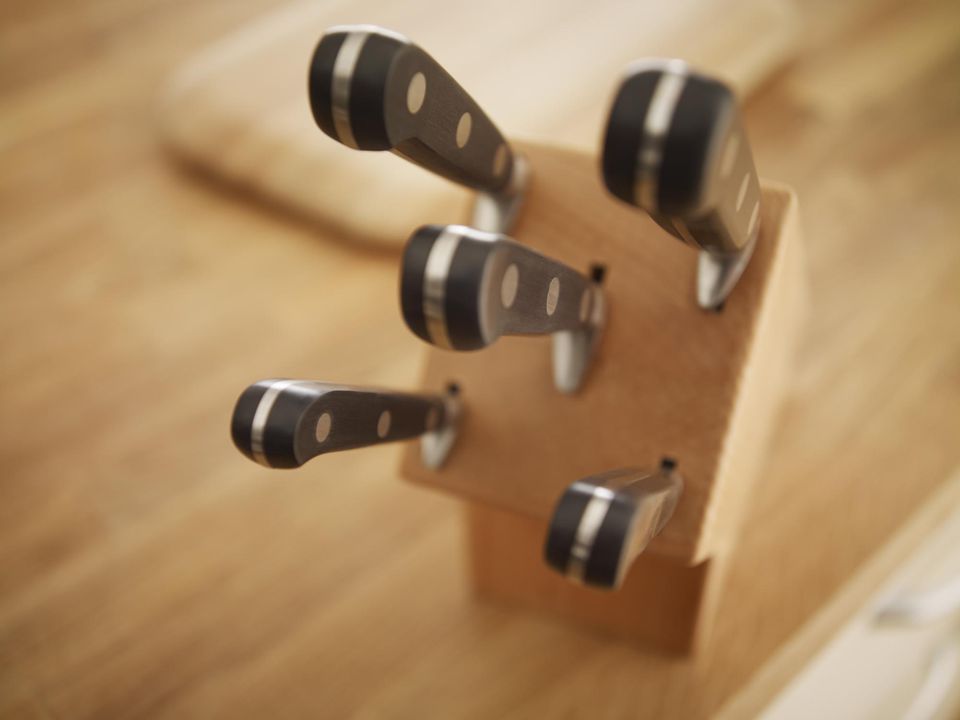Caring for your kitchen knives properly ensures that they'll last you for years to come. And considering that good-quality knives can cost upwards of $100 per knife, it's important to know how to prolong the life of your investment.
Following these dos and don'ts will help keep your knives in like-new condition.

There are many storage options for knives that store them safely and keep the blades protected.
A magnetic strip mounted on a kitchen wall is one option. This keeps knives within easy reach and makes it easy to grab the one you want. But magnetic strips are not a good idea in a household with small children, unless they are mounted high and above a counter. Knife blocks are another option. Look for a knife block that stores knives sideways so they're not resting on their blades, or one with a material designed to keep blades from dulling. One option is the Bodum knife block, which is filled with tiny plastic rods, and can hold a a wide number of knives and variety of blade shapes. The rods keep the knives in place without dulling the blades and they're removable and dishwasher safe for cleaning. Finally, you can also seek out knife storage drawer inserts, which have slots to keep your knives in place. The downside to knife blocks is that unless you memorize the positioning of which knife goes where, and always make sure to put each knife back in its place, it might take a few tries before you pull out the knife you are looking for.
Culinary students learn this on their very first day: A dull knife is a dangerous knife, because the extra force required to cut foods can mean the knife could slip and cut you. Honing and sharpening your knife regularly will keep it safe and efficient to use. First, know the difference between honing and sharpening: Honing straightens out the microscopic "teeth" that comprise the very edge of the blade, which bend to one side as the knife is used over time, while sharpening actually abrades ultra-fine particles from the metal blade to recreate the blade.
A honing steel can help realign the blade to keep it in optimal cutting condition, while a knife sharpener will restore the blade to like-new sharpness. Sharpeners are available in a handheld rod, or in manual or electric versions where a knife is passed through a slot so that you're abrading the edge and just the right angle. You can also get your knives professionally sharpened if they are very dull or if you're nervous about doing it yourself; many kitchenware stores offer this service for only a few dollars per blade.
Even if a manufacturer touts its knives as being dishwasher safe, it's best to hand-wash your knives. The rough agitation of a dishwasher can damage the blade by knocking it against other utensils or dishes. What's more, the harsh detergents and high heat used in dishwashers can deteriorate your blade. And finally, it can be unsafe to keep sharp knives in the dishwasher; you could accidentally cut yourself reaching into the racks.
A knife is easiest to clean right after it's used, before juices or food particles have a chance to dry on the blade. And if you've used the knife to cut acidic foods like tomatoes or citrus fruits, those juices could corrode the metal or cause spotting.
And letting knives sit in a sink or a basin of water is a bad idea – you could cut yourself reaching into the water.
It's not hard to do. Just use a sponge or dishcloth and warm, soapy water to wash the blade by folding the sponge over the back of the blade and pulling from the handle end of the blade to the tip. Then carefully wash the handle. Rinse it afterwards with warm water and immediately dry the knife with a dry dishtowel.
The right cutting boards can keep your knife sharper for longer. Avoid cutting boards made from glass, ceramic or marble, which do not have any "give" and will dull your knife – not to mention, knives can slip on the hard, slick surface. Wood and bamboo are both ideal cutting surfaces, as they will not dull the blade.
In particular, look for cutting boards made from end-grain wood, because the individual grains will part around the blade as it makes contact with the board. Some chefs and home cooks prefer plastic, which is also gentle on blades, and has the added advantage that it can be sanitized in a dishwasher. There are also a number of new composite cutting boards that are made of materials like resin and paper combined, which offer a great balance of durability and blade protection (Check out those from Epicurean, for instance).
With proper maintenance, use and care, your kitchen knives will last you a lifetime, so treat them right!